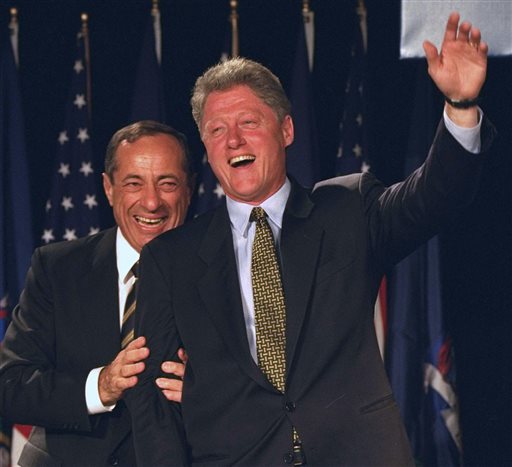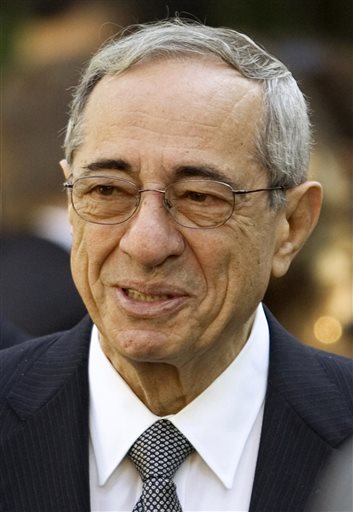A kid from Queens who became NY governor

In this Oct. 19, 1994, file photo, President Bill Clinton, right, waves from the stage at a New York hotel as New York Gov. Mario Cuomo helps to direct the president’s gaze. AP
NEW YORK — Mario Cuomo loved to tell the story of how his father, an immigrant from Italy, lost his business in the Wall Street Crash of 1929.
“A broker jumped out the window and landed on his push cart,” Cuomo explained.
A joke, of course. Cuomo had a cutting sense of humor. He and I were members of the same club; he would tell my wife every time he saw her, “Ugly men married to beautiful women.”
Cuomo was an old-fashioned guy, revealing little directly. But his push cart joke went to the heart of who he was both personally and politically.
His “Tale of Two Cities” keynote address at the 1984 Democratic National Convention about a nation divided between haves and have-nots was both a challenge to Ronald Reagan’s image of America as a “shining city on a hill” and a description of his own life.
Ever the outsider, he was a kid from Queens, where passengers on the subway were directed to Manhattan with signs that said “to the city.” That was his shining city — not on a hill but on an island towering toward the sky when viewed from the boroughs. He opened a law firm on Court Street across the river in Brooklyn looking from the outside in at those skyscrapers where the white-shoe Manhattan law firms operated.
He was driven by an insecurity that emerged in the oddest ways. He rarely spent a night away from home. He once had the state police drive him hours through the snow when a storm grounded his flight back from Buffalo. It’s true that merely the idea of spending 100 days in Iowa, as his advisers said he would have to, could have been enough to put him off running for president.
His combativeness in sports was legendary. One state Senate staffer recalls Cuomo, a former minor league baseball player, going on the radio and denouncing not only his policy prescriptions but also his basketball prowess. I covered him for many years both before and during his governorship. Yet every time I saw him, even 30 years later, he would recall not the extraordinary times we had lived through together but the home run I had “stolen” from him in a supposedly friendly softball game between his office and the legislative correspondents.

In this June 18, 2008, file photo, former New York Gov. Mario Cuomo attends the funeral of NBC’s “Meet the Press” host Tim Russert, outside of Holy Trinity Church in Washington. AP
Cuomo discovered a skill that channeled that competitiveness and ended up taking him far. He could outtalk, outargue, almost anyone. So he would argue with almost everyone. “If words were birds,” his best friend, Fabian Palomino, once said, “he’d be covered in …” Well, you know what.
I got used to his 6 a.m. calls. One time, I had a story in that morning’s paper about how differently journalists and politicians from far away, like Washington, viewed him compared to those in Albany, who were exposed to him. Maybe we were even overexposed to him. He spent an hour on the phone telling me I was wrong.
His sense of being an outsider made him the figure he became. It shaped his politics. He understood inequality from experience. When he spoke of those left out, there was always in the background his own story of fighting to get in, fighting to be taken seriously by the Manhattan crowd.
His father dug ditches and then ran a shop. Mario Cuomo became a great American success story by becoming the great storyteller of his political generation. His party, under Bill Clinton, went in a different direction, a third way that avoided talk that might be divisive. The inequality Cuomo denounced has grown dramatically and with it a political unhappiness that became so strong that a politician from the boroughs named Bill de Blasio, who had worked for Clinton, was elected mayor by saying New York had become “A Tale of Two Cities.”
Mario Cuomo wanted to be mayor but never won the job. Thirty years later, the issue of inequality as Cuomo framed it in that 1984 convention speech has become a national issue.
Michael Oreskes, a senior managing editor for The Associated Press, was Albany bureau chief for The New York Times from 1982 to 1984, which spanned Cuomo’s election and first two years in office.














